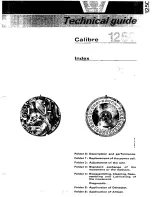
Operation Guide 5274
E-9
Charging Time to Recover from Dead Battery
Exposure Level
(Brightness)
Approximate Charging
Time to 1-second Hand
Movement
Approximate Time to
Full Charge
Outdoor sunlight (50,000 lux)
3 hours
24 hours
Sunlight through a window
(10,000 lux)
11 hours
94 hours
Daylight through a window on
an overcast day (5,000 lux)
18 hours
144 hours
Indoor fl uorescent lighting
(500 lux)
175 hours
– – –
Important!
The watch will continue to run for about six months after a full charge, even if it is
not exposed to light. For stable operation, however, expose it to light as much as
possible.
E-8
Charging Time
The times below are general guidelines for reference only.
Charging Time to Support Daily Use
Exposure Level (Brightness)
Approximate Charging Time
Outdoor sunlight (50,000 lux)
8 minutes
Sunlight through a window (10,000 lux)
30 minutes
Daylight through a window on an overcast day
(5,000 lux)
48 minutes
Indoor fl uorescent lighting (500 lux)
8 hours
E-7
Low Battery Alert
The second hand will jump at two-second intervals to alert you when the charge is
low.
2-second jump
Low charge
Regular Timekeeping
Low Battery Alert
Charged
E-6
Caution!
The case of the watch may become quite hot when charging. Guard against burn
x
injury after charging.
Avoid charging in the following locations, and anywhere else where the watch may
x
become very hot.
On the dashboard of an automobile parked in the sun
−
Close to an incandescent light source or other sources of heat
−
Locations exposed to direct sunlight for long periods
−
Low Charge and Dead Battery Conditions
An alert operation is performed when the battery charge goes low.
E-5
Solar Charging
A solar panel generates electrical power that charges a built-in (secondary) battery.
The entire face is a solar panel, so power is generated when the face is exposed to
light. Keep the watch exposed to light as much as possible.
Charging the Battery
When you are not wearing the watch, leave it where it is exposed
to light. For stable operation, expose the watch to at least a half
day of light per month.
When wearing the watch, try to keep your clothing from blocking
its face (solar panel). Charging effi ciency is reduced signifi cantly
even if the face is blocked only partially.
E-4
Contents
E-2
Before Using the Watch for the First Time
E-5 Solar
Charging
E-11 Indicators and Crown Operation
E-12 Setting the Current Time and Day
E-12
To adjust the time setting
E-13
To change the day indicator setting
E-14 Using the Stopwatch
E-18 Abnormal Hand Movement or Function
E-20 Specifi cations
E-3
Crown Operations
Some water-resistant models (100 meters, 200 meters)
have a screw-in crown. When you need to perform a crown
operation, rotate it towards you to unscrew it. Then pull
the crown out. Avoid applying undue force when pulling.
The watch loses its water resistance while the crown is
unscrewed. After performing a crown operation, fully screw
the crown back in.
Crown
Loosen
If your watch has a rotary bezel...
You can rotate the bezel to align its
▼
mark with
the minute hand. Then you will be able to tell how
much time has elapsed since aligning the
▼
mark.
Start
Elapsed time
Current
E-2
Before Using the Watch for the First Time
Crown
Spacer
Depending on your watch model, there may be a spacer
x
installed at the factory around the crown. If your watch has
a spacer, you should remove the spacer before using the
watch.
After removing the spacer, use the procedures in “Crown
x
Operations” (page E-3) and “To adjust the time setting” (page
E-12) to set up the watch for use.
E-1
ENGLISH
Your watch may differ somewhat from the one shown in the illustration.
x
MA1203-EA
Ú#!3)/#/-054%2#/,4$





















